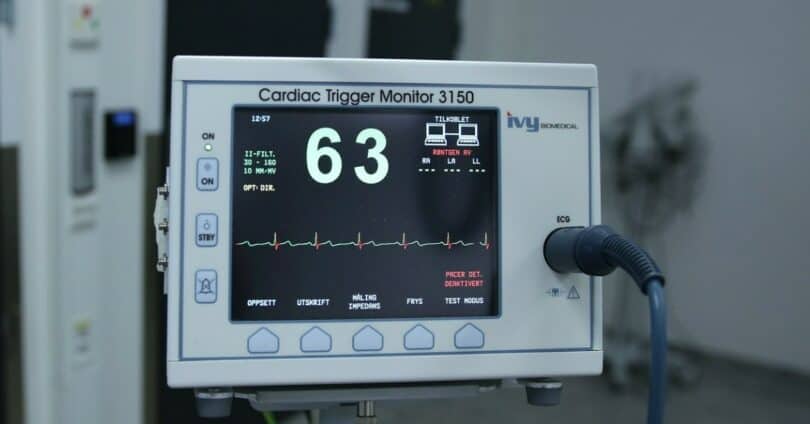In the ever-evolving landscape of healthcare technology, medical devices continue to push the boundaries of innovation, particularly when it comes to heart monitoring. The heart, our most vital organ, is a complex system that demands utmost precision in diagnosis and care. Fortunately, thanks to breakthrough advancements in medical engineering, we now have a new generation of cutting-edge heart monitoring devices that are revolutionizing patient care. From wearable gadgets that seamlessly blend into our daily lives to high-tech implants that provide real-time data to doctors, these six remarkable devices are changing the game in heart health. Without further ado, let’s get to the list.
Cup Electrodes
Cup electrodes represent a significant advancement in the field of cardiac signal monitoring, providing an improved and more accurate method for acquiring electrical activity from the heart. These specialized electrodes, designed to make direct contact with the skin, offer enhanced signal quality compared to traditional adhesive patches or surface electrodes.
The concave shape of the cup electrode allows for better skin coupling, reducing signal noise and artifacts, leading to more reliable data for heart monitoring applications. You can also find disposable cup electrodes in various sizes and materials to suit different application needs, making them ideal for one-time use in medical settings.
Moreover, cup electrodes are increasingly integrated with cutting-edge wearable and implantable devices, further enhancing their utility in long-term heart health tracking and diagnostics, promising a transformative impact on cardiovascular medicine.
Advanced Holter Monitors
Holter monitors have been a staple in heart monitoring for decades, but recent advancements have propelled them to new heights in terms of accuracy and data analysis capabilities. Advanced Holter monitors now come equipped with cutting-edge features, such as high-resolution ECG recording and extended battery life, allowing for continuous, long-term heart monitoring in real-world settings.
These devices seamlessly integrate with mobile applications and cloud-based platforms, enabling remote monitoring and data analysis by healthcare professionals. The incorporation of artificial intelligence algorithms further enhances their diagnostic potential, enabling the automatic detection of arrhythmias, ischemic events, and other cardiac abnormalities.
With their improved usability and precision, advanced Holter monitors play a crucial role in early detection and comprehensive management of cardiovascular conditions, ultimately leading to better patient outcomes.
Optical Coherence Tomography (OCT) Intravascular Imaging
Optical Coherence Tomography (OCT) has emerged as a cutting-edge medical imaging technique for assessing coronary arteries and heart tissue at a microscopic level. In intravascular OCT, a miniature catheter equipped with a specialized light source is inserted into the coronary arteries, allowing real-time imaging of vessel walls and plaque composition. This high-resolution imaging provides unparalleled insights into plaque morphology, identifying vulnerable plaques and guiding interventional procedures with exceptional precision.
With its ability to visualize coronary structures and detect subtle changes in vessel walls, OCT plays a crucial role in assessing stent deployment, optimizing stent selection, and assessing post-interventional outcomes. As a non-invasive and powerful diagnostic tool, OCT significantly contributes to improved decision-making, enhancing patient safety, and elevating the standard of care in interventional cardiology.
Nanotechnology-Enabled Biosensors for Point-of-Care Heart Monitoring
Nanotechnology has revolutionized the development of biosensors for point-of-care heart monitoring, providing portable and highly sensitive devices for rapid diagnosis and continuous tracking of cardiac biomarkers. These miniature devices utilize nanomaterials such as nanoparticles, nanowires, and nanotubes to enhance the sensor’s surface area and improve its detection capabilities.
Nanotechnology-enabled biosensors can detect minute concentrations of specific biomarkers in blood or saliva, providing valuable information about heart health and potential cardiovascular issues. With their portability and real-time data transmission capabilities, these biosensors empower both healthcare professionals and patients to monitor cardiac biomarkers outside traditional clinical settings, enabling early intervention and proactive management of heart conditions.
Artificial Intelligence-Assisted Remote Heart Monitoring Systems
Artificial Intelligence (AI) has transformed remote heart monitoring systems, elevating their efficiency and diagnostic accuracy. AI algorithms analyze vast amounts of patient data, including ECG readings, activity levels, and vital signs, to identify patterns and deviations indicative of potential heart issues. These systems can continuously monitor patients remotely, providing real-time alerts to healthcare professionals when anomalies are detected, allowing for timely interventions and personalized care plans.
The AI-driven analysis also enables risk prediction and personalized treatment recommendations, enhancing patient outcomes and reducing the burden on healthcare facilities. By harnessing the power of AI in remote heart monitoring, these systems pave the way for a more proactive and patient-centric approach to cardiovascular health management.
Bioelectronic Medicine
Bioelectronic medicine represents a groundbreaking approach to heart monitoring and treatment, where implantable devices interact with the body’s nervous system to modulate cardiac activity. These miniature devices, often referred to as neuromodulators or neurostimulators, are strategically placed near cardiac nerves or the heart itself to regulate electrical signals and neural pathways.
By precisely controlling nerve impulses, bioelectronic implants can restore proper heart function, alleviate arrhythmias, and manage conditions like heart failure. These devices offer a personalized and adaptive treatment approach, as they can be programmed and adjusted to respond to individual patient needs in real-time. Bioelectronic medicine is at the forefront of cutting-edge therapies, demonstrating immense potential for revolutionizing cardiac care and improving the quality of life for patients with various heart conditions.
Heart monitoring has witnessed remarkable advancements with the introduction of cutting-edge medical devices. Cup electrodes enhance signal acquisition, while advanced Holter monitors enable long-term precision monitoring. Optical Coherence Tomography provides microscopic insights into coronary health, and nanotechnology-powered biosensors offer point-of-care convenience. Additionally, AI-assisted remote monitoring systems aid in early detection and personalized care. Moreover, bioelectronic medicine heralds a new era of cardiac modulation. These innovative technologies collectively redefine cardiovascular healthcare, fostering early diagnosis, improved patient outcomes, and a more patient-centric approach to managing heart health.









